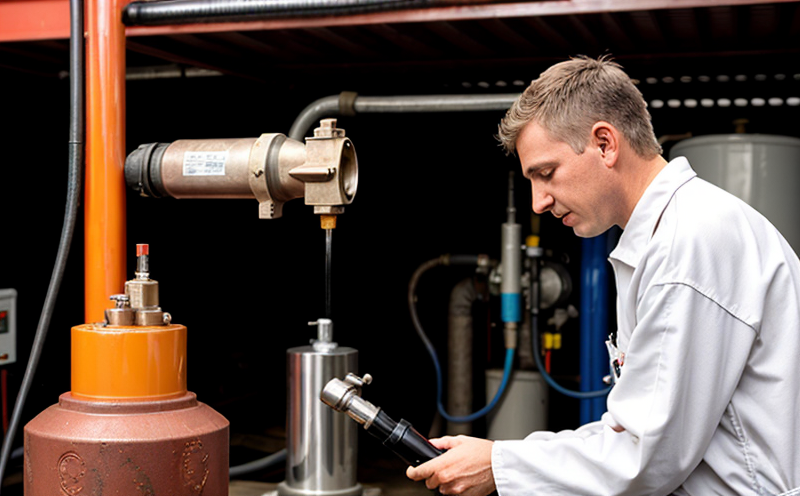ISO 6245 Determination of Electrical Conductivity of Jet Fuels
The ISO 6245 standard is a critical benchmark in the aviation and aerospace sectors, designed to ensure that jet fuel possesses the appropriate electrical conductivity levels. This property is crucial for preventing static electricity build-up during refueling operations, which can lead to hazardous conditions such as sparking or fires.
Electrical conductivity serves as an indicator of fuel purity and quality, reflecting the presence of water and impurities in the fuel. By measuring this parameter according to ISO 6245, laboratories and testing facilities can ensure that fuels meet stringent safety and operational standards set by regulatory bodies such as the International Civil Aviation Organization (ICAO) and the Federal Aviation Administration (FAA).
The test involves precise measurement techniques to determine the electrical conductivity of jet fuel samples using a specialized conductometer. The apparatus required includes a conductive cell, a reference electrode, and a standard power supply. Sample preparation is meticulous; it requires ensuring that the sample is representative of the batch being tested and free from external contaminants.
The process begins with the collection of an adequate amount of jet fuel in a suitable container, followed by thorough mixing to achieve homogeneity. The sample is then transferred into the conductive cell for measurement. The test procedure specifies specific temperature conditions due to the known temperature dependence of electrical conductivity in fuels. This ensures that results are accurate and comparable.
Accurate reporting of results is paramount; this includes providing detailed descriptions of the fuel batch, the testing parameters used, and the final reported value. Compliance with ISO 6245 standards helps stakeholders ensure that jet fuels meet safety requirements, thereby enhancing operational efficiency and reducing risks associated with fuel-related incidents.
Understanding the nuances of ISO 6245 is essential for quality managers and compliance officers in ensuring that their processes are up-to-date and aligned with international best practices. For R&D engineers, this test can be a valuable tool in refining fuel formulations to meet increasingly stringent safety standards. Procurement teams benefit from consistent application of this standard to verify the reliability and quality of fuels they source.
The accuracy and precision of ISO 6245 testing are crucial for maintaining aviation safety and operational integrity. By adhering to these international standards, laboratories can ensure that their services meet the highest industry benchmarks, fostering trust among clients and stakeholders.
- Ensures safe refueling operations by preventing static electricity build-up
- Guarantees fuel purity and quality through precise measurement techniques
- Maintains operational efficiency by ensuring compliance with aviation safety standards
- Fosters industry trust through accurate, standardized reporting of results
Industry Applications
The ISO 6245 standard finds extensive application across the aerospace and aviation industries. It is particularly relevant for fuel suppliers, refueling facilities, and aircraft operators who must comply with stringent safety regulations.
Fuel suppliers use this test to ensure that their products meet quality standards before distribution. Refueling facilities rely on ISO 6245 results to verify the conductive properties of incoming fuels, ensuring safe and efficient operations. Aircraft operators also benefit from consistent compliance with these standards, as it enhances safety during refueling processes.
By leveraging this test, stakeholders can minimize risks associated with fuel-related incidents and ensure that their practices are in line with international best practices. This standard is a cornerstone for maintaining aviation safety and operational integrity across the industry.
Why Choose This Test
- Ensures safe refueling operations by preventing static electricity build-up
- Guarantees fuel purity and quality through precise measurement techniques
- Maintains operational efficiency by ensuring compliance with aviation safety standards
- Fosters industry trust through accurate, standardized reporting of results
Competitive Advantage and Market Impact
Adhering to ISO 6245 not only enhances safety but also provides a competitive edge by demonstrating a commitment to high-quality standards. Airlines and other aviation companies can leverage this standard to differentiate themselves in the market, ensuring that they meet or exceed industry benchmarks.
In today’s highly regulated environment, compliance with international standards like ISO 6245 is increasingly seen as a key differentiator. It enables organizations to build strong reputations for reliability and safety, which are critical factors influencing customer trust and satisfaction. This standard also supports continuous improvement in fuel quality management, contributing positively to the overall market impact.





